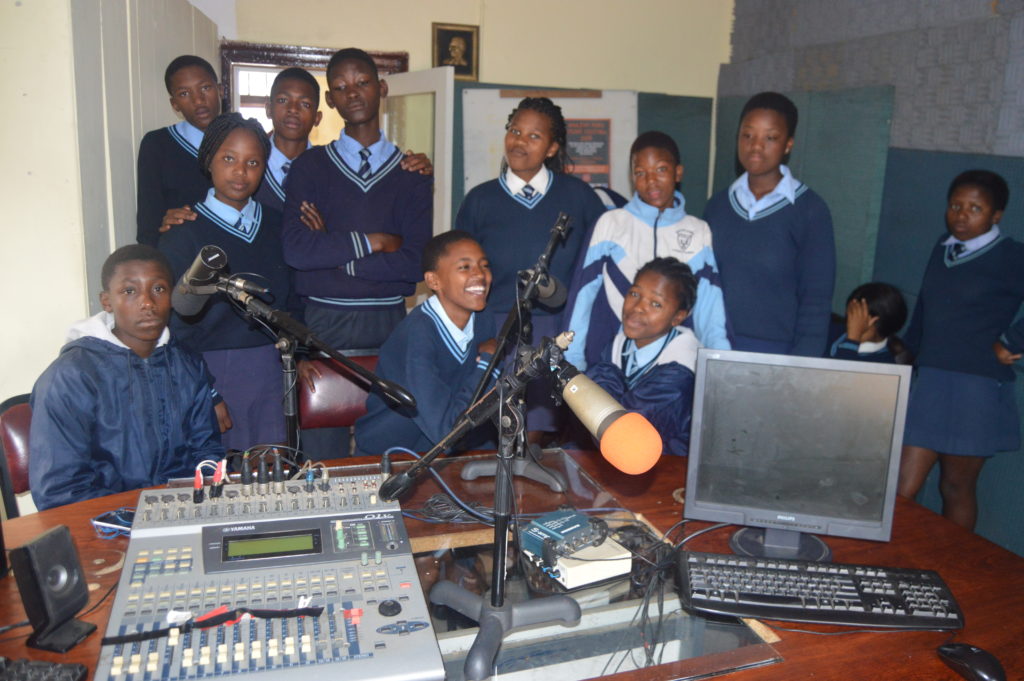The Amazwi Puku Story Festival kick-started its 7th annual festival, running from 21 – 23 February
2019 hosted by Nelm, based in Makhanda. The 21 February is a very important day worldwide as it is
the International Mother Language Day. Also, 2019 has been declared by UNESCO as the
International Year of Indigenous Languages. It was no wonder the likes of Akhona ‘Bhodlingqaka’
Mafani wowed the crowd with his isiXhosa lingo. His isiXhosa poetry and talk on the importance of
reading, writing and speaking in isiXhosa nailed the points home, equipping everyone and especially
the learners.
Ululations and whistles followed as Mafani praised his clan names, demonstrating the value of
knowing who you are in an African way. Others joined in too, and the auditorium was abuzz,
‘ingulowo ezithutha’ (everyone singing their praise-names).
“#NgesiXhosaSamNdingalwaNdibebomvu!” Mafani said to the cheers of the crowd, repeating that in
unison with him. This simply means ‘I will die for my isiXhosa language’.
Zongezile Matshoba followed with a short talk, explaining the importance of the event and the
celebration of isiXhosa as one of the most important indigenous languages in Africa. He quoted
author L.S Ngcangata who warned that isiXhosa writers to avoid things that impact negatively on
isiXhosa literature,
Ulwimi lwesiXhosa luxhomekeke kuni, babhali. Ziphepheni izinto ezilimaz’ uluncwadi,
Qhwethan’ amabibi namkhwiniba, nibonis’ ubungcali. Ngenxa yenu iincwadi
zesiXhosa zizimakade. Ziya kuhlala zikho kube ngunaphakade.
Matshoba also quoted another writer who frequents Makhanda as manager of Wordfest, Sonwabile
Mfecane in his book, ‘Isabhokhwe’ when he argues that isiXhosa getting thinner and thinner, but he
does not think that the language is sick but the sick are those who are supposed to be enriching it.
“Ndiyasithanda kakhulu isiXhosa. Ndiyasibona siyabhitya, kodwa andicingi ukuba
siyagula. Ndicinga ukuba asondliwa. Mhlawumbi kugula lo mntu umele ukusondla.”
“You dream and communicate with your ancestors in your own language,” he said, adding “even
when you die, having spoken English with a TV accent, people will say …”. The crowd completed the
sentence for him, “a Xhosa has passed on!”
Matshoba, along with Mafani, read some poetry from the likes of Simphiwe Nolutshungu (‘Ulwimi
Lwam lwakwaXhosa’ from Ingcango Zentliziyo, 2015) and Mangaliso Buzani (‘Ndibhala Umbongo’
from Ndisabhala Imibongo, 2014).
ULWIMI LWAM LWAKWAXHOSA
Lukhangelelwa phantsi ziintlanga
De nathi balo sadikwa lulo
Lujijeke lwade lwagoba
Lakrolonqwa de lwamfameka
Kwikhaya leenkedama,
Kulapho luqeqeshwa khona.
Emasimini phaya akukho mnkcenkcesheli
Ebumnyameni phaya akukho nyanga
Engqondweni phaya akukho kucinga
Esazeleni phaya akukho kuphila
Entabeni phaya akukho themba
Emafini phaya akukho thontsi.
Asithongi kukuqokelel’ eziny’ iilwimi
Asiphumli kukujija ulwimi
Sihlek’ inyanga nelanga‐
Phantsi kwamafu esiNgesi
iAfrika yethu siyizele ngomva ukukhongozel’
inkcubeko yaseNtshona.
Singamakhumsha adel’ iintloni
Ngeempumlo ukusintsentsetha
De kusabele oondlebe zikhany’ ilanga
Ubungqondi sibulinganisa nesiNgesi
Ze ubudenge sibunxibise olwethu
Inkedam’ ebazali badl’ amazimba.
Mna ndedwa ndakulwa kubuy’ uNxele
Ndityityimbe kuvakalelwe ubumnyama bam
Ndilondle olu lwam‐
Ndilondlele izizukulwana zeAfrika
Ndakuma ke phantsi kwethunzi lezigxeko‐
De kukhanye nasemqolombeni apho.
(Simphiwe Nolutshungu, 2015)
Ndibhala umbongo
Ndibhala umbongo
iyeza elivuselela ibhongo kumzi kaXhosa
eliphilisa amanxeba kusapho oluNtsundu luphela
incasa ekrakra kumzi womgquba
ingoma yolwaluko yakwaXhosa
ethetha ngezithethe namasiko
ubuntu nembeko
ubuciko nenkcubeko
kodwa lona uthi mandithule
zezaseMbo ezo
kumzi kaQaba
(Mangaliso Buzani: 2014)
Matshoba added that these two are award winning isiXhosa authors from the Eastern Cape, are both
winners of the South African Literary Award (SALA) that is equivalent to the SAMAs, SATMA, and
SAFTAs but they remain unknown.
Cebo Solombela, a fascinating facilitator for children’s programme and writer of children’s books,
was the driver of the programme.
The day would have not been successful enough without literature linking with other art forms. Well
known Makhanda pantsulas, Via Kasi Movers, blessed the audience with their stage performance
called ‘Dancing with the dead’. The piece is directed by Masixole Heshu, a Rhodes University
postgraduate student. Two students from Ntsika Secondary School concluded the day by sharing
with their own isiXhosa poems.


